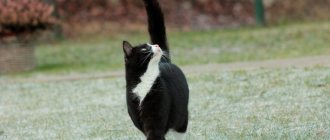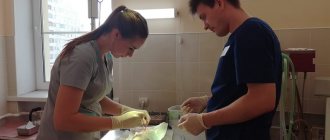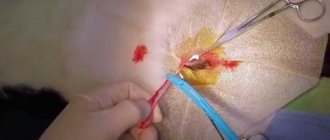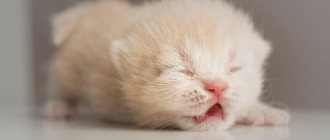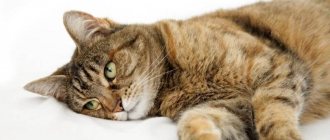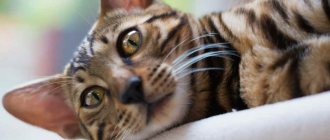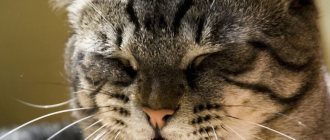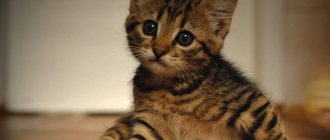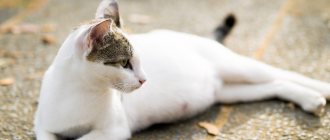Sneezing is the body's natural response to an irritant and helps clear the upper respiratory tract. The reasons that awaken this reflex are not always harmless. If your kitten sneezes frequently, take the time to check with your veterinarian about what it might be. At a young age, all pathologies are more acute, and self-medication can lead to serious consequences, including the death of the pet.
Physiological causes of sneezing
If the condition of the mustachioed pet is stable, and the duration of sneezing does not cause concern, there is a high probability of a physiological cause. In this case, the reflex is awakened by external stimuli that appear during rare cleaning or a certain microclimate in the room. Also, a sneeze can be explained by a specific body structure characteristic of a particular breed.
Ingress of dust or debris
A kitten's nose is very sensitive, and its owners are incredibly inquisitive. The mustachioed fidgets are constantly exploring something, climbing into secluded corners inaccessible to their two-legged owners. Direct contact with dust or debris irritates the nasal mucosa, causing a defensive reaction.
Try to do wet cleaning more often, but don’t go to extremes. A cat is a “liquid”. If she needs it, she will crawl through any crack, despite her parameters. It is unrealistic to achieve complete sterility, so it is enough just not to forget about regular room hygiene.
Dry indoors
Dry air dries out the secretions that lubricate the nasal mucous membranes. The protective barrier becomes thinner, increasing the likelihood of catching a cold or infection.
Lack of moisture can be noticed by peeling of your own skin and strong electrification of hair. If there are plants in the house, they begin to dry out at the tips of the leaves. Children and pets often experience coughs and runny noses. Solving the problem is quite simple - place buckets of water around the house, hang wet towels, or resort to a modern method - buy an air humidifier.
Breed Features
One of the reasons why a kitten constantly sneezes is the anatomical feature of the structure of its muzzle. This is typical for representatives of extreme breeds: exotics, Himalayans, Persians, British and Scottish. All of them were bred artificially and, unlike aboriginal cats, escaped natural selection.
The experiments of breeders trying to create an unusual appearance have led to the appearance of a funny flattened muzzle with a small nose. Despite their attractive appearance, such animals often suffer from problems with the respiratory system and are predisposed to many genetic diseases.
Viruses that most often cause sneezing
- Feline herpes virus . Animals become infected from each other. Treatment is symptom control.
- Calicivirus. The virus is contagious, but not to humans. Mouth ulcers are the most common problem, but infection can affect the respiratory system and even cause pneumonia.
Infections can make the kitten more prone to other problems. For example, a cat with herpes sometimes develops a bacterial infection.
The cause of a kitten's sneezing may be other infectious diseases:
- feline infectious peritonitis, which may initially cause no signs but then becomes severe;
- Feline immunodeficiency virus develops slowly, but greatly affects the cat's immune system, leaving it vulnerable to other infections;
- leukemia is a serious disease with frequent fatal outcomes;
- chlamydia leading to conjunctivitis;
- bordetellosis;
- mycoplasmosis.
Diseases that cause frequent sneezing
If attacks become more frequent and accompanying symptoms appear, it is more reliable to get diagnosed. After an examination, the veterinarian will determine why the kitten is sneezing and what to do to normalize its condition.
Viruses and bacteria
With an infectious disease, in addition to sneezing, other alarming symptoms appear. The baby's nose becomes hot and dry. Fever, runny nose and cough appear. Tearfulness increases, and discharge from the eyes and nose may contain impurities of pus or blood. The small pet loses activity and refuses to eat. Possible intestinal upset and vomiting.
Most often, kittens are diagnosed with calcivirosis, rhinotracheitis, chlamydia and bordetellosis. All these pathologies affect the upper respiratory tract and can provoke the development of pneumonia. Their occurrence can be prevented through vaccinations and following preventive recommendations.
Allergy
Frequent sneezing, sniffles, red eyes and itching are the main symptoms of allergies. Allergens include pollen, decorative cosmetics, household chemicals, tobacco, house dust, litter, food and many other irritants. It is very difficult to recognize the cause of allergies on your own, so you cannot do without the help of a veterinarian.
Lack of timely assistance is fraught with exacerbation of attacks and the appearance of bronchial asthma. In severe cases of this pathology, the animal may die from suffocation.
Parasitosis
Irritation of the upper respiratory tract is caused by lung and heartworms, which pose a mortal danger to the infected person. In addition to increased tearing, breathing problems and a runny nose, parasitosis causes diarrhea and nausea. The waste products of helminths poison and weaken the body. Your pet may suddenly lose weight even if it maintains its appetite.
Nasal polyps
Polyps are growths that arise due to deformation of the mucous membrane. They can move around the nasal cavity and are usually not accompanied by pain. Due to the blockage of air passages, the animal begins to suffer from a lack of oxygen. This is accompanied by wheezing, snoring and copious discharge of clear fluid.
Foreign body
Smell is one of the ways to understand the world. A small pet becoming familiar with a new object may accidentally inhale it. If the object that gets inside turns out to be too large, it will be impossible to remove it on your own. The baby will sneeze and scratch his nose. If the mucous membrane is damaged, the resulting discharge may turn scarlet.
Cold
The symptoms of a cold and an infection are similar. The only difference is that in the first case the animal gets sick due to hypothermia. The immune system fails when exposed to a draft for a long time, walking in inclement weather, wool that is not sufficiently dried after bathing, frequent use of air conditioning, and other situations that disrupt natural heat exchange. A weakened body is more vulnerable to viruses and bacteria, so a secondary infection may occur against the background of a cold.
Oral problems
Dental diseases can be recognized not only by sore gums and sore teeth, but also by sneezing. Usually the reflex is awakened by inflammation and is accompanied by increased salivation and snoring.
Oncology
Nasal cavity cancer is a rare disease typical of older animals and representatives of the European Shorthair breed. Usually, owners notice it at a late stage, when the pet develops mucous discharge with blood and begins to have convulsions. It is almost impossible to save the animal by this time. To avoid a fatal outcome, veterinarians recommend checking a kitten at risk immediately after the appearance of frequent sneezing, loud snoring and heavy discharge.
When is a visit to the vet necessary: the most dangerous signs
Thus, sneezing in kittens may indicate the development of serious pathologies in the kitten’s body. But in what cases is a visit to the vet necessary? In situations where sneezing is accompanied by one or more of the following symptoms:
- Copious discharge (especially purulent) from the conjunctival cavity, development of ulcerations.
- Green or yellow discharge from the nasal passages.
- The animal is apathetic and does not respond to stimuli from the external environment.
- Increase in general body temperature.
- Producing large amounts of saliva (especially when it is white and flaky).
- Absence or significant deterioration of appetite, against the background of a significant increase in thirst.
- Swelling and tenderness of the subcutaneous lymph nodes.
- Wheezing, gurgling in the chest, persistent cough and other signs of damage to the respiratory system.
- Deterioration of the coat condition.
- Difficult and hoarse breathing.
- , other signs of damage to the digestive system.
If the kitten sneezes from time to time, but this is not accompanied by the signs described above, and the animal’s condition does not cause any concern, then you just need to monitor the pet for a couple of days.
If the sneezing does not stop, or the animal’s condition begins to worsen with the development of the symptoms described above, you should immediately call a veterinarian.
Associated symptoms
The likelihood of pathological causes increases along with the expansion of symptoms. If you notice at least one of the symptoms listed below, be sure to sign up for a diagnosis at a veterinary clinic.
Difficulty breathing and wheezing
When cats have breathing problems, they wheeze, snore, or begin to breathe from their belly. This method of breathing is accompanied by a distinct movement of the abdominal cavity and weak movement of the ribs. These changes indicate pain that interferes with normal pulmonary breathing.
Wheezing, whistling, and sniffling occur when mucous or watery fluid accumulates. This occurs with internal injuries, pneumonia, allergies and swelling.
Lacrimation and suppuration of the eyes
Pay attention to the amount and nature of discharge. Excessive leakage of fluids, the appearance of pus, blood or other impurities is an alarming sign characteristic of an infection or tumor.
Cough
A coughing attack resembles vomiting, but excludes the appearance of a watery mass. The sick animal presses itself to the floor, stretching its neck and shuddering in convulsions. Isolated cases are not dangerous and go away on their own. If the frequency increases and your pet begins to wheeze and cough up mucus, call your doctor.
Nose bleed
A condition accompanied by the appearance of blood always requires medical intervention. Nosebleeds occur with injuries, allergic reactions, colds, inflammatory processes and low air humidity. Blood from damaged vessels can drain into the stomach, causing vomiting, or rise through the nasolacrimal duct directly to the eye sockets.
Asymptomatic sneezing
The absence of symptoms is not always a reason to celebrate. If the sneezing persists and there is no clear connection with physiological reasons, it is better to play it safe. Some pathologies may remain asymptomatic for a long time. It is impossible to detect them in the early stages on your own, so it is safer to take a blood test and do an ultrasound with x-ray.
Symptoms seen in a sneezing cat
If your cat sneezes frequently due to external irritants or exposure to allergens, then there will be no other symptoms. However, it also happens that at first the cat simply sneezes, and then other signs of deteriorating health are added.
These are the symptoms that accompany sneezing in cats.
:
- discharge from the nose and eyes;
- copious amounts of saliva;
- refusal of food and water;
- nose bleed;
- cough;
- breathing problems;
- aggressive behavior;
- increased anxiety;
- general weakness;
- inflammation of the mucous membranes.
When a cat sneezes, mucus comes out of his nose. By the nature of the nasal discharge, you can often determine whether your pet’s sneezing is due to a common cold, or whether the cause is a more serious condition. Cloudy discharge indicates the presence of an infectious disease.
Bloody signs may indicate the presence of polyps, oncology or other serious pathologies that cause the cat to sneeze. With allergies and colds, the mucus will be clear.
What is reverse sneezing?
Reverse sneezing, or reverse breathing, is an involuntary inhalation that resembles a suffocation attack. Most often it occurs in brachycephalic dogs, but is sometimes diagnosed in sphinxes and other felines. Despite the frightening picture, this condition is not a pathology and goes away on its own.
If a mustachioed pet sharply stretches its neck and begins to swallow air noisily, do not rush to get scared. A similar effect is observed when quickly absorbing food or playing too actively. The only cause for concern is too frequent attacks, accompanied by the appearance of other alarming symptoms.
How to help your pet and how to treat it
Only a qualified veterinarian can determine exactly what to do when a cat sneezes. You should not try to independently determine the diagnosis and prescribe treatment. When determining the causes of sneezing in a kitten or an adult animal, the doctor takes into account many different factors and prescribes tests and other tests.
In addition to a visual examination of the animal, the doctor will need additional information from the owner. It is necessary to inform the veterinarian about the age, weight of the pet, its temperature during the last 24 hours, and its daily diet. You may also need information about your last deworming (taking deworming pills), dates of vaccinations, and previous visits to medical care.
To determine the reasons why your cat often sneezes, you may need to take tests and undergo additional examinations. Usually, a clinical and general blood test, an analysis to detect a fungal or other infection, bacterial culture, and cytology are sufficient.
If significant pathologies are suspected that are causing the cat to sneeze, examination methods such as biopsy, endoscopy, computed tomography and x-ray may be prescribed.
The answer to the question “what to do if a cat sneezes” will depend on the results of the examination. The veterinarian will prescribe a course of treatment and determine its timing.
In some cases, your pet can be treated without taking medications. It happens that a cat constantly sneezes due to problems with the gums and teeth. It will be enough to eliminate this factor, and the sneeze will go away. Domestic cats need to take good care of their teeth. They need to be cleaned periodically using a special brush and paste.
If a sneeze is caused by mycosis, oral and external antifungal agents (tablets and ointments) are prescribed.
If there are viruses or infections, your pet should be given antibiotics. If the sneezing was caused by herpes, the cat is prescribed lysine-containing drugs.
In the presence of serious diseases (polyps, oncology), treatment is carried out in a hospital. A cat that often sneezes due to tumors needs surgical treatment and constant medical supervision.
In most cases, a cat that sneezes frequently does not need to be hospitalized at a veterinary clinic. Before returning home, you need to have detailed information about the treatment and care regimen for your pet. In the first days of treatment, a cat who is sneezing will need attention, care and care. It will be necessary to remove discharge from the nose and eyes. Any changes in the animal’s condition (positive or negative) require attention.
They must be reported to your doctor. A return visit to the veterinarian may be required.
What to do if your kitten sneezes often
Treatment for a mustachioed pet will depend on the diagnosis. The owner can only temporarily extinguish the symptoms on his own. Without eliminating the root cause, they will recur over time, so home care is only effective under the supervision of a veterinarian.
At home
Place the kitten in a warm, draft-free place. If you have difficulty breathing, be sure to inhale warm and moist air. A bathroom filled with steam after a hot shower is suitable for this.
Do not allow your eyes to stick together due to accumulated fluid. Remove discharge with a cotton pad soaked in plain water or saline solution. If bleeding occurs, apply ice wrapped in thick cloth to your pet's nose and immediately go to the veterinarian.
Treatment prescribed by a veterinarian
If there is no improvement within 24 hours, the animal will have to be treated with medication. Depending on the diagnosis, the doctor may prescribe the following medications:
- antiviral;
- antibiotics;
- antihistamines;
- decongestants;
- healing ointments;
- anthelmintics;
- immunomodulators.
In particularly severe cases, surgery or chemotherapy may be required. When dental diseases are detected, dental treatment is always carried out under general anesthesia.
Help for a newborn
The habitat of newborn babies is limited. For natural reasons, they sneeze from the mother’s hairs getting into the sinuses, or from increased dryness. If the nose does not contain foreign objects, and there is a humidifier in the room with the kittens, call a veterinarian at home. At such a young age, all dosages are selected individually so as not to harm the growing body.
Inhalant irritants, allergens
If your kitten has sneezed once or twice, something is probably irritating his nasal passages. Think about whether this happens after you light the candles? Or after the cat visits the litter box?
Examples of possible irritants or allergens in animals:
- cigarette smoke;
- perfume;
- cat litter, especially those that create dust;
- cleaning and detergents;
- candles;
- dust;
- mold.
In cats, allergies do not cause sneezing as often as in humans. If the cause of sneezing is an allergy, then sometimes there is itching of the skin.
Other Possible Sneezing Factors
Many other circumstances can contribute to a kitten sneezing. For example, it is common for cats to sneeze for 4-7 days after receiving the intranasal vaccine.
Cats may sneeze to try to dislodge trapped hair or debris from the nasal passage. A gum infection or tooth inflammation sometimes causes sneezing. In very rare cases, it can signal cancer.
What not to do when treating a runny nose in a cat
To treat your cat, it is recommended to use the treatment prescribed by your veterinarian. It is not recommended to use the following methods without his approval:
- give antibiotics without prescription;
- use herbal preparations if you have allergies;
- give drugs that are intended for people, but not animals (some drugs are only suitable for humans);
- walk your pet if it has an elevated body temperature;
- often give an antipyretic, body temperature may drop below the minimum level, which will lead to a drop in blood pressure, a sharp loss of strength, and fainting;
- give hormonal substances;
- Treat the animal yourself if only 1 of the signs of illness appears, that is, the cat could sneeze, but this does not necessarily mean the appearance of a runny nose or cold.
Many medications require veterinarian approval. If the pet owner neglects this rule, he may get complications. For example, when treating a viral disease with antibiotics, a fungal infection and disruption of the intestinal microflora may gradually develop.
Rhinitis is often complicated by conjunctivitis
